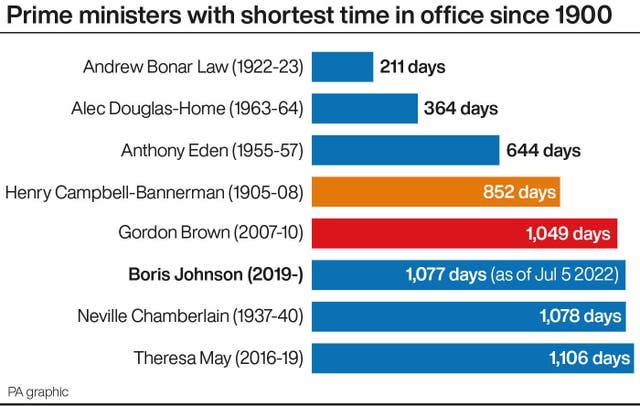Boris Johnson bids to save premiership after Cabinet resignations
Rishi Sunak quit as chancellor on Tuesday, alongside Sajid Javid who resigned as health secretary.

Boris Johnson has been left trying to save his premiership after a pair of Cabinet resignations and a series of Government exits threatened to force him from Number 10.
Rishi Sunak quit as chancellor on Tuesday, alongside Sajid Javid who resigned as health secretary, in a move that came just as the Prime Minister was being forced into a humiliating apology to address the row over scandal-hit former deputy chief whip Chris Pincher.
The pair were swiftly replaced on Tuesday night, with Nadhim Zahawi promoted to be the new Chancellor and Steve Barclay becoming Health Secretary.
Mr Sunak and Mr Javid, both potential leadership rivals, offered sharp criticisms of Mr Johnson in their resignation letters.
Mr Sunak said “the public rightly expect government to be conducted properly, competently and seriously”, adding: “I believe these standards are worth fighting for and that is why I am resigning.”
Mr Javid said the British people “expect integrity from their government” but voters now believed Mr Johnson’s administration was neither competent nor “acting in the national interest”.
Tory former Brexit minister Lord David Frost supported their resignations, noting they had done so after he similarly stepped down in December.
“Other Cabinet ministers now need to consider whether they are truly happy with the current direction of travel”, Lord Frost wrote in the Telegraph, adding that Mr Johnson should quit his post or risk “taking the party and the Government down with him”.
The controversy stemming from the resignation of Mr Pincher had engulfed Downing Street in recent days, as the Prime Minister faced questions about how much he knew of the allegations and rumours surrounding the Tory MP before he was appointed as deputy chief whip.
Mr Pincher quit as deputy chief whip last week following claims that he groped two men at the upmarket Carlton Club, but Mr Johnson knew about allegations against him as far back as 2019.
The Prime Minister acknowledged he should have sacked Mr Pincher when he was found to have behaved inappropriately when he was a Foreign Office minister in 2019, but instead Mr Johnson went on to appoint him to other government roles.
Asked if that was an error, Mr Johnson said: “I think it was a mistake and I apologise for it. In hindsight it was the wrong thing to do.
“I apologise to everybody who has been badly affected by it. I want to make absolutely clear that there’s no place in this Government for anybody who is predatory or who abuses their position of power.”
MPs were told that Mr Johnson had not recalled being told about the earlier 2019 allegations.
Deputy Prime Minister Dominic Raab, the then foreign secretary, gave Mr Pincher a dressing down over his “inappropriate” conduct “in no uncertain terms” at the time and the Cabinet Office’s propriety and ethics team was also involved.
No 10 had initially claimed Mr Johnson had not been aware of any “specific allegations”, after Mr Pincher’s dramatic resignation.
By Monday that line had evolved to acknowledge the Prime Minister was aware of “allegations that were either resolved or did not progress to a formal complaint”.
This latest row followed closely on a number of other setbacks for the Prime Minister.

His authority had already been damaged by a confidence vote which saw 41% of his own MPs withdraw their support.
The loss of crunch by-elections in Tiverton and Honiton and Wakefield in June triggered the resignation of party chairman Oliver Dowden, while there is still lingering anger over coronavirus lockdown-busting parties in Downing Street.
Mr Johnson still retains the support of several Cabinet ministers including Dominic Raab, Liz Truss, Michael Gove, Therese Coffey and Ben Wallace, with universities minister Michelle Donelan now taking on the education portfolio.
Yet the hours after Mr Sunak and Mr Javid quit brought further resignations from Government.
Bim Afolami quit as Tory vice-chair live on TV, Theo Clarke and Andrew Murrison resigned as trade envoys and ministerial aides Jonathan Gullis, Saqib Bhatti, Nicola Richards and Virginia Crosbie left their roles.
Solicitor General Alex Chalk also quit on Tuesday night.
The Prime Minister’s fate may ultimately lie with backbench MPs if the Tory 1922 Committee’s rules are changed to allow another confidence vote within 12 months.
Allies of Mr Johnson believe that is unlikely as it would leave any future leader with a “gun to their head”.
More immediately, Mr Johnson will endure a grilling from MPs on all sides of the House on Wednesday at Prime Minister’s Questions, while later he will be interrogated by the Commons Liaison Committee.
That is likely to be a particularly brutal grilling, with the committee, chaired by Sir Bernard Jenkin, peopled with a host of Tory MPs far from sympathetic to his leadership.
Ministers loyal to Mr Johnson, who will need to re-shuffle various Government roles following the resignations, had rallied round him following the Tuesday night resignations.
Culture Secretary Nadine Dorries said he “consistently gets all the big decisions right”, while Brexit Opportunities Minister Jacob Rees-Mogg said the mandate won at the 2019 general election “should not be taken away from him because a number of people resign”.
Mr Rees-Mogg, who spoke to Mr Johnson on Tuesday night, said he remained “unflappable”.
It remains to be seen if Mr Johnson, who has established a reputation for escaping controversy, will survive the coming weeks.
Seven in 10 Britons say Boris Johnson should resign, according to a snap YouGov poll of more than 3,000 people, while the Times newspaper used an editorial to call on Mr Johnson to go.
“Every day that he remains deepens the sense of chaos. For the good of the country, he should go,” it said.





